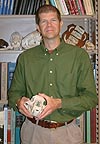July 15, 2005
Hellgren to lead wildlife research laboratory
CARBONDALE, Ill. -- Zoology professor Eric C. Hellgren, now at Oklahoma State University, will become the new permanent director of the Cooperative Wildlife Research Laboratory at Southern Illinois University Carbondale.Hellgren will take the reins Sept. 1. The SIU Board of Trustees ratified his appointment on Thursday (July 14).
Hellgren specializes in wildlife nutrition and physiology as well as large mammal ecology and management.
He succeeds the lab's interim director, William H. Muhlach, who's been overseeing the prolific research facility since the death of Director Alan Woolf in April 2004. Woolf was only the second person ever to head the highly respected wildlife research lab, founded in 1950.
Muhlach will return to his full-time position as chair of the zoology department in the College of Science.
"Professor Hellgren is one of the nation's rising stars in the wildlife science research field and his addition to the SIUC family will greatly enhance the reputation of the University. I am confident that under his leadership the wildlife lab will rise to even greater heights of excellence and contribute significantly to our efforts to achieve the goals of Southern at 150," SIUC's John A. Koropchak, vice chancellor for research and dean of the graduate school, said in announcing the appointment.
A unique program within the University's Graduate School, the lab emphasizes training and research in the principles and applications of ecology and wildlife biology.
Hellgren's research interests dovetail nicely with the laboratory's mission.
During more than 50 years of service, SIUC's wildlife lab has pioneered methods of converting old strip mines into havens for fish and waterfowl and increased understanding of bobcats, deer, tundra swans, quail, geese, ducks, river otters, beavers and other species.
Hellgren, writing on his OSU Web site, explains his specialties this way: "With increasing human populations and landscape fragmentation comes a need to understand vertebrate responses to these pressures. Because of my interests in population and nutritional ecology, my students tend to work on demographic and nutritional responses of mammals and reptiles to manipulations, such as burning, grazing and fertilization."
"Within this applied context, I also study basic ecological questions such as competition, resource partitioning and life history variation," he adds.
Prudence M. Rice, vice chancellor for research and director of the Office of Research Development and Administration, chaired the search committee that recommended Hellgren's hire.
Hellgren joined OSU's faculty as assistant professor of zoology — specializing as a wildlife and physiological ecologist — in 1995 and rose to full professor in 2002.
Before that he taught graduate courses and did research at the Caesar Kleberg Wildlife Research Institute, within Texas A&M University's department of animal and wildlife sciences.
He variously conducted mammal research projects at Virginia Tech University, Virginia Polytechnic Institute and University, and Texas A&M from 1983 to 1988.
He earned a bachelor's degree in fishery and wildlife biology at Colorado State University (May 1982), a master's degree in wildlife science at Texas A&M (August 1984) and a doctorate in wildlife science at Virginia Polytechnic Institute and State University (December 1988).
Recruiting and retaining talented faculty is among of the goals of Southern at 150: Building Excellence Through Commitment, the long-range plan the University is following as it nears its 150th anniversary in 2019.

